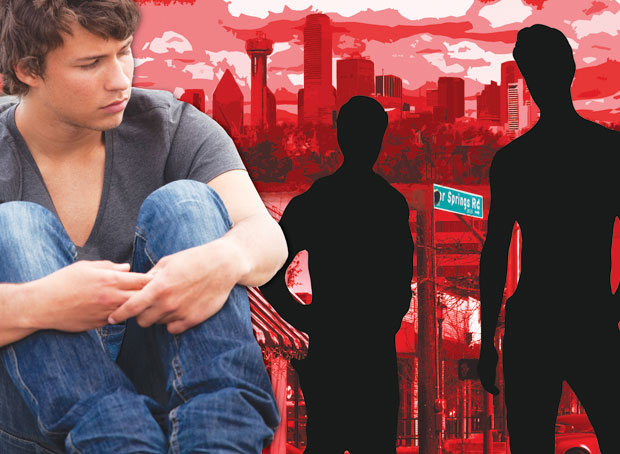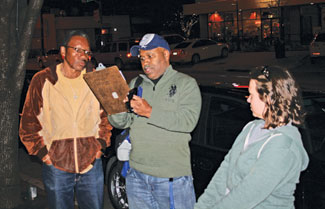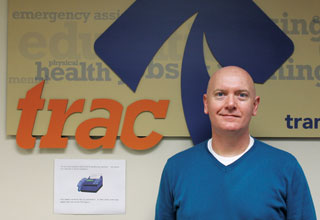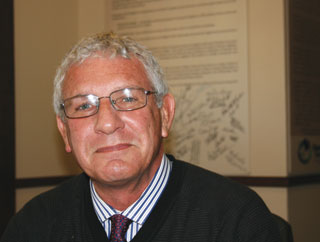Homeless LGBT youth in Dallas often turn to drugs, prostitution if social workers don’t find them first — and advocates say they need the community’s help

DAVID WEBB | Contributing Writer
Every weekend a hunt takes place on the streets of Dallas for some of society’s most vulnerable members, and their fate often depends upon who finds them first, according to social workers who note that LGBT youth are homeless at twice the rate of the general youth population.
The homeless young people under pursuit by both social workers and others whose motives are suspect — often sinister — tend to blend into the scene.
That makes the youths, who typically dress like average teenagers, difficult to identify and to engage in conversation, which is the first step in gaining their confidence and initiating sustained contact.
The young homeless population differs substantially from their older counterparts because they are unlikely to be found sleeping in homeless shelters, under bridges, in parks and the like. Their youth often affords them the opportunity to spend the night with relatives, friends and acquaintances, which is why “sofa surfing” has become popular to describe their nomadic lifestyle.

HUNTING THE HOMELESS | Promise House case managers Benjamin Williams, center, and Jessica Amspoker talk to Terry Fisher, a homeless man, on Cedar Springs last month. Promise House provides temporary emergency shelter for young homeless people, and Amspoker and Williams say older homeless people are often the best source of information about where to find youths on the streets. (David Webb/Dallas Voice)
The youths often are distrustful of older people who approach them on the street because they quickly learn there are criminal-minded individuals circulating, whose motives sometimes mirror the real life horrors of primetime television crime dramas. Dallas is a city of beautiful skyscrapers with bright colorful lights beckoning visitors, but it also has a vast, ugly underbelly harboring drug trafficking, prostitution, pornography productions and every other type of vice imaginable to which young people can become prey.
Amie McNamara, interim director at Youth First Texas in Dallas, said her organization provides a safe place for all LGBT youths to meet and receive counseling and reliable support from peers. It also works to counteract the harmful influences homeless young people encounter when they leave their homes, she said.
“Gay, lesbian and transgender youths have a much harder time,” McNamara said. “They tend to get kicked out more.”
Sometimes, they leave home on their own because the conditions there are deplorable or abusive, according to social workers.
Once away from the protection of responsible adults, homeless youths face big challenges to survive, and if they are LGBT the challenges often are greater because of anti-gay discrimination and feelings of inferiority, McNamara said. They often make bad choices because of the absence of authority figures to guide them, she added.
“They feel they sometimes have no choice but to get involved in the sex trade,” McNamara said. “Their need is so great it is easy for them to get involved with an adult who has ulterior motives.”
Often the adult simply offers to allow the homeless youth a meal and a sofa to sleep on, but the youth soon learns there are “strings attached,” said McNamara, adding she could think of a dozen who are depending on the generosity of friends or others for shelter. If the youth is at least 17, no laws apparently are being broken in the sex-for-shelter scenario because that is the age of legal consent, and presumably some people are sincere in their offers to help, without expectations of something in return.
Youth First Texas arranged a telephone interview with one youth who is homeless and 18. His name is being withheld because of his age and vulnerability, and the name Ricky is being used to protect his identity. He offered to allow the use of his name, which may be reflective of immature thinking that fails to take into account that he might feel differently about such public exposure when he’s older.
Ricky has been homeless since he was 15, when his mother kicked him out of the house because he declared he was gay. His mother threatened to kick him out in a text message while he was at school, and when he arrived home he found the locks had been changed.
“She was like, ‘If you are not going to abide by rules, get out,’” Ricky said. “I thought she was joking. I didn’t know where to go or who to call. All I could do was sit there and cry.”
Ricky said his mother wanted him to hide his sexual orientation rather than coming out. Had he dropped the subject and remained closeted, he could have stayed, he said.
“She wanted to pretend like it never happened,” said Ricky, who noted he couldn’t accept those terms. “It’s my life.”
Since then Ricky, whose father is a truck driver who has no permanent residence because he is on the road all the time, has alternated living with friends and other relatives. He now lives with a sister, and his father pays Ricky’s share of the rent so he can go to high school, where he’s a junior.
Ricky said homelessness disrupted his life, causing him to get involved with alcohol, drugs and prostitution while he was staying with a female friend who had older friends. Those older friends introduced him to behavior he now regrets, said Ricky, who also got a tattoo and a face-piercing during that period of apparent rebellion.
Ricky failed a grade in high school because of the situation, and he is now a year behind in graduating.
“I bounced around from home to home after I was kicked out,” said Ricky, who hopes to get a part-time job, graduate from high school, go to college and become a high school teacher specializing in theater. “It has ripped a hole in my family.”
Ironically, Ricky’s mother has come out as a lesbian and lives with another woman. He now suspects her fears about her own sexual orientation caused her to be unreasonably harsh with him.
“I wouldn’t want to live with her now, but she hasn’t offered to let me,” said Ricky, who notes he considers the leaders and other youth at Youth First Texas to be his family now.
Ricky’s plight has become all too common in today’s society, which seems to be mostly unaware of the problems. Every year a new generation of ages out of foster care and the juvenile justice system, and an estimated 50 percent wind up homeless within six months because they aren’t prepared for independent living.

GETTING THEM BACK ON TRAC | Jerry Sullivan, assistant director for the Transition Resource Action Center, which provides transitional housing, said at one point in the last year two-thirds of the youth TRAC was serving were LGBT. (John Wright/Dallas Voice)
The nation’s estimated 1.7 million homeless and runaway youths come from all socio-economic backgrounds and cultures, and it is estimated that 20 percent of them are LGBT, according to statistics compiled by the National Coalition for the Homeless. In comparison, the number of LGBT youths in the general youth population is estimated at only 10 percent, according to the Washington, D.C.-based group.
“If you are an LGBT youth, you are twice as likely to be homeless as teens in the general population,” said Mike Faenza, president and CEO of the Metro Dallas Homeless Alliance. “Anything that causes additional challenges to individuals — stress, stigma, discrimination and other psychological factors — also impact and present barriers to stability within the family.”
Faenza noted that all homeless people tend tobecome victims of crime at higher rates, but young people who don’t have the guidance of concerned adults are especially vulnerable.
“They are exposed to people preying on them and exploiting them,” Faenza said. “They come into contact with people offering to help them, but they actually are just using them sexually. There are serious risks to kids who are homeless, and it is escalated for kids that have challenges or are traumatized because they are struggling to come out.”
Ricky represents the type of youth that social workers such as Benjamin Williams and Jessica Amspoker want to meet and help before they get involved in self-destructive lifestyles. They are case managers involved in street outreach for Dallas-based Promise House.
Williams and Amspoker hit the streets on Thursday, Friday and Saturday nights looking for youth who need help. The pair regularly visits the Cedar Springs entertainment district in Oak Lawn, as well as places like the Greyhound and DART stations in downtown Dallas.
On the streets Williams and Amspoker offer youths protection at Promise House, which provides temporary emergency shelter for young homeless people to help them get back in school, get jobs or even join the military. The social workers travel as a team because the work can be dangerous in that the youths they approach might be under observation by pimps or drug traffickers.
Amspoker said young people who are homeless and need help are difficult to track and approach. Most don’t realize there are resources such as Youth First Texas and other homeless assistance programs available to help them, she said.
“Every day is different,” Amspoker said. “We’re talking about a transient community. It’s a lifestyle where they have to stay on the move. Where they are staying last week may not be where they are this week.”
Williams said homeless youths are often deceptively average looking because they “don’t look homeless.”
“These young people are still going to want to be presentable and impress people,” Williams said. “They understand appearances are everything.”
Many still have cell phones because their parents will continue to pay the bills so they can remain in contact with them, Williams said. Curiously, the parents say they are comforted to know their children are “still alive,” apparently unmindful of the other hazards of life on the street, he said.
Williams said they make many of their connections with young people by handing out cards with information about Promise House to everyone they see. Older homeless people will sometimes tip them to where they can locate homeless young people, he said.
“We try to build a reputation by being at places at regular times,” Williams said. “They eventually learn they can trust us.”
Once contact is made with homeless youths, emergency shelter is provided at Promise House if they want it. Sometimes, a homeless youth will call them later to say they have decided to take advantage of the help being offered them.

COUNTING THE KIDS | Mike Faenza, president and CEO of the Metro Dallas Homeless Alliance, said there’s never been a good count of the homeless young people in Dallas, but he hopes results from a survey in January will remedy that. (David Webb/Dallas Voice)
If the homeless youths are LGBT, Williams and Amspoker will refer them to Youth First Texas for counseling and support.
When a youth enters Promise House, which can temporarily house 20 people ages 10 to 17 and eight people ages 18 to 21 at a time, every individual is first offered a meal and a shower, said Sonja Parkhill, an outreach manager. The staff has worked with a transgender individual more than once who has wanted help finding a place to live, she noted.
“Some of them wind up on the streets again,” Parkhill said. “They go to another place, and they don’t make it there and go back on the streets. Sometimes, they call us and ask if they can come back. Unless they’ve done something that prevents it, they can come back.”
One of the resources for homeless young people is the City Square Transition Resource Action Center, or TRAC, which provides transitional housing for homeless people struggling to become stable. In one program, individuals of the same sex who are moving toward employment or full-time schooling are temporarily provided a private bedroom in a three-bedroom apartment and food. In another program the individual is provided with their own one-bedroom apartment for which a Section 8 voucher temporarily pays for a portion of the rent based on their income. The organization also manages a permanent housing program for disabled people.
Jerry Sullivan, assistant director for TRAC, said the organization is a safe place for minorities, including LGBT people. He also noted that the majority of young people becoming homeless appear to be those who are aging out of foster care.
“In the youth we see on a daily basis that identify as LGBT I do think the national statistics play out locally,” Sullivan said. “At one point in the last year we noticed that two-thirds of the youth we were serving were LGBT, but that’s not always the case.”
Sullivan noted he met with Resource Center Dallas officials recently to share information about what resources his organization has available for homeless LGBT youth. Referrals are welcome, he said.
“There’s a fair amount of resources,” said Sullivan.
Cece Cox, executive director and CEO of Resource Center Dallas, said it’s clear that the number of homeless LGBT youth is disproportionate to the general population of youth, and the organization is dedicated to working with TRAC, Promise House, Youth First Texas and Metro Dallas Homeless Alliance to address the issue. More attention needs to be raised about the problem of homelessness among LGBT youth, she said.
Over the years Resource Center Dallas leaders have provided cultural competency training to law enforcement personnel, Texas Alcoholic Beverage Commission agents and others who might come into contact with homeless LGBT youth, Cox said. But there needs to be more education about LGBT youth and their increased risks of becoming homeless, she said.
“There hasn’t been a voice in the past, and we’re bringing that issue to the table,” Cox said. “If Dallas is addressing homelessness, they certainly need to include the issue of LGBT youth.”
Faenza, of Metro Dallas Homeless Alliance, said there has never before been a good count of the homeless young people in Dallas, but he hopes the one that occurred in late January will remedy that. The documentation is needed to get more resources dedicated to young people, he said.
“We’re trying to develop political will,” said Faenza, who has been involved in social work for more than three decades. “We need to do more for kids.”
Faenza said there are many ways that the LGBT community can get involved in helping homeless LGBT youth. Anyone who is aware of a homeless LGBT youth should refer them to any of the agencies working with homeless youths.
People can also get involved by becoming educated about the issue and volunteering to help with advocacy, Faenza said. Speakers are available to attend gatherings such as small receptions to discuss the issue, he said.
For people who have the room and time to give, temporary housing is also needed for youths, Faenza said.
“We need help,” Faenza said. “We need people to get involved. That would be wonderful, and there is a world of things that can be done. We would love to talk with anyone who is interested in helping.”
………………………………………………………
Homeless youth resources
• Youth First Texas
214-879-0400
www.youthfirsttexas.org
• Promise House
214-941-8578
www.promisehouse.org
• City Square TRAC
214-370-9300
www.citysquare.org/TRAC
• Metro Dallas Homeless Alliance
972-638-5600
www.mdhadallas.org
• North Texas Youth Connection
800-568-7776
www.ntxyouthconnection.org
• City House, Plano
972-424-4626
www.cityhouse.org
………………………………………………………….
This article appeared in the Dallas Voice print edition February 17, 2012.
















EXCELLENT article. Thank you. And if you think it can be tough for homeless kids in Dallas, try Fort Worth and compare the resources. Please do a follow-up article on Tarrant County. Maybe Denton County also.
Thank you for raising the awareness about this issue. I wanted to add that TRAC (a program of CitySquare) is here to provide services to youth leaving systems of care (foster, residential, juvenile justice). LGBT youth are over-represented in those systems and are a significant proportion of the youth we serve. We are proud to be a safe space for those youth as well as all of the youth we serve.
This is one of the best stories that The Dallas Voice has done in some time it is truly issues based and it brings tears to my eyes. with the government cutting the funding for youth services we must act as a community in order to insure that no youth is left behind. we must expand on the issues facing our young people and let them know that they are loved and wanted and that god loves them as well. I think alot of times we all just throw money at a problem with out knowing the real issues and we need these orgnizations that deal with this need to offer alot more services and peer meadation as well. I could go on and on but Dallas has an orgnization for this but if you have this problem and that problem you alot of times need to go to other orgnizations for help. i believe that it is discurgeing to youth to have to go to 3 differant places to get the help that they need we need shared resources in dallas
I am heartbroken. Any parent who would disown or throw his/her son or daughter out on the streets because of the child’s sexual orientation is clearly unfit for parenthood, and should be charged with endangerment to a child. A parent’s love for his/her children should be unconditional. It should not come with the attitude of “I love you…unless I don’t like the way you turn out in which case I reserve the right to discard you and make another one.” Parents with that attitude never loved their children to begin with, and it is truly regrettable that we cannot flip a switch and “turn off” their ability to reproduce.
great article. I can’t imagine a parent kicking their 15 year old child out of the house. Those parents should be made to pay child support to their children or to provide an alternate place for them to live and money for them to live on. The state legislature should get involved in this and change the laws. Of course, being that we have a republican led state legislature, I doubt that will happen
Just been re-posting and sharing the phone numbers and such,…thanks for doing this article,…I sent all the reporters there at your newspaper a heartfelt “THANK YOU” as well. Great info and I know there are many, many out there stuck and doing exactly what your article talks about daily! Thanks again folks.